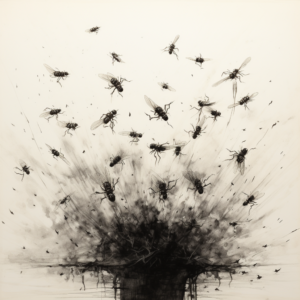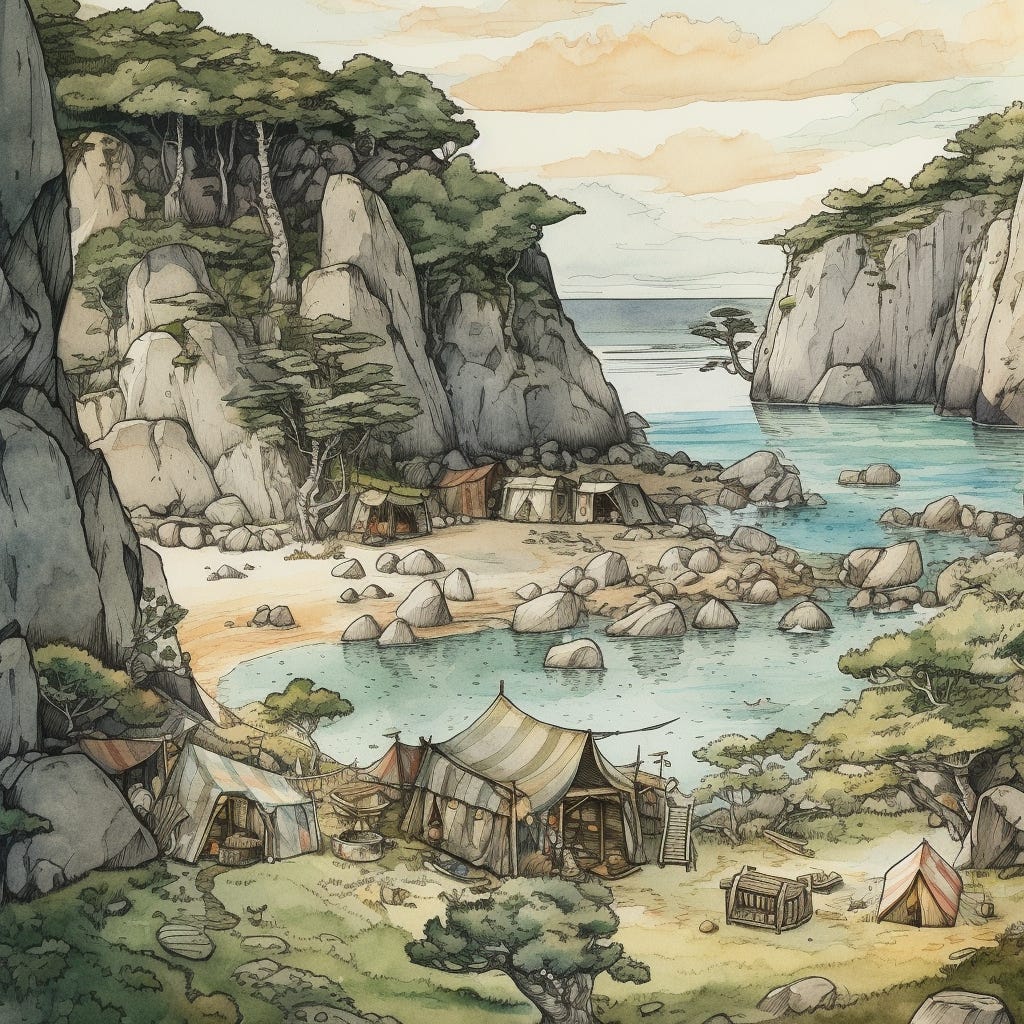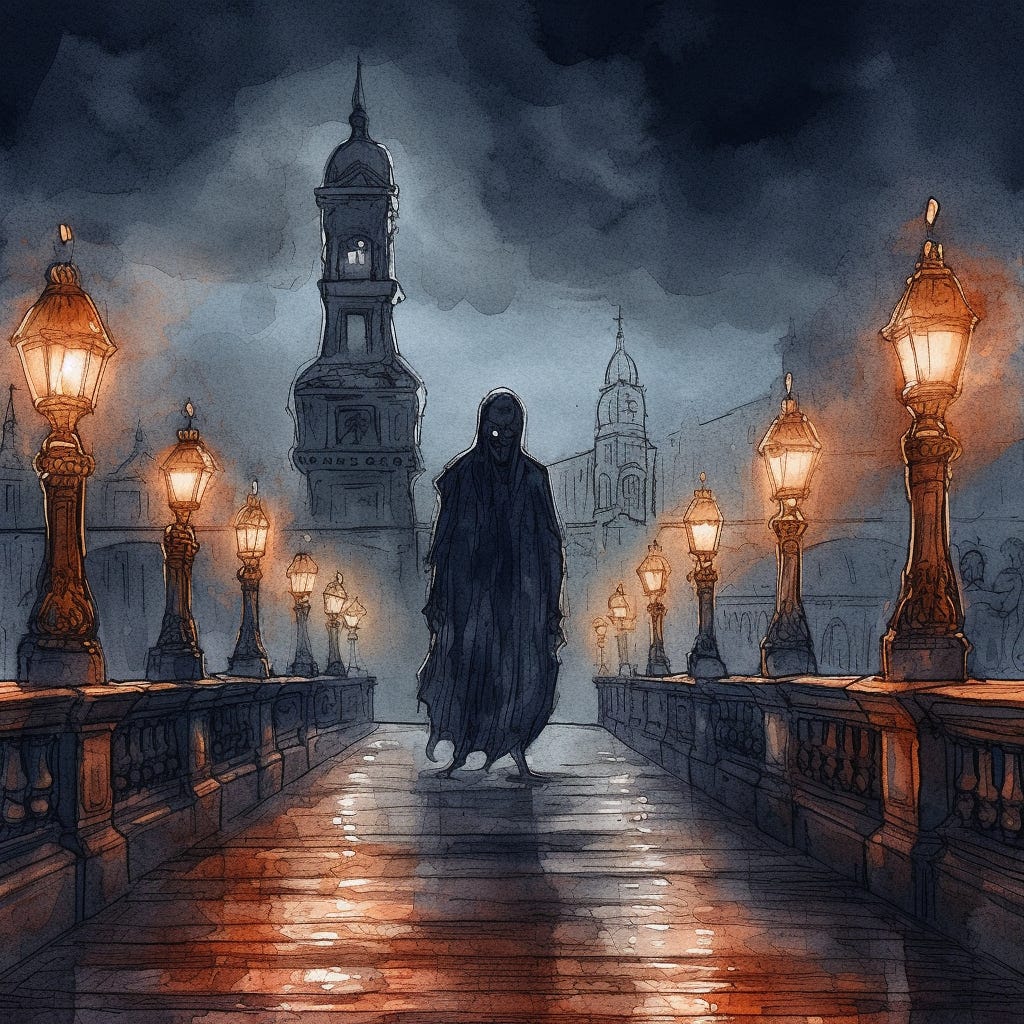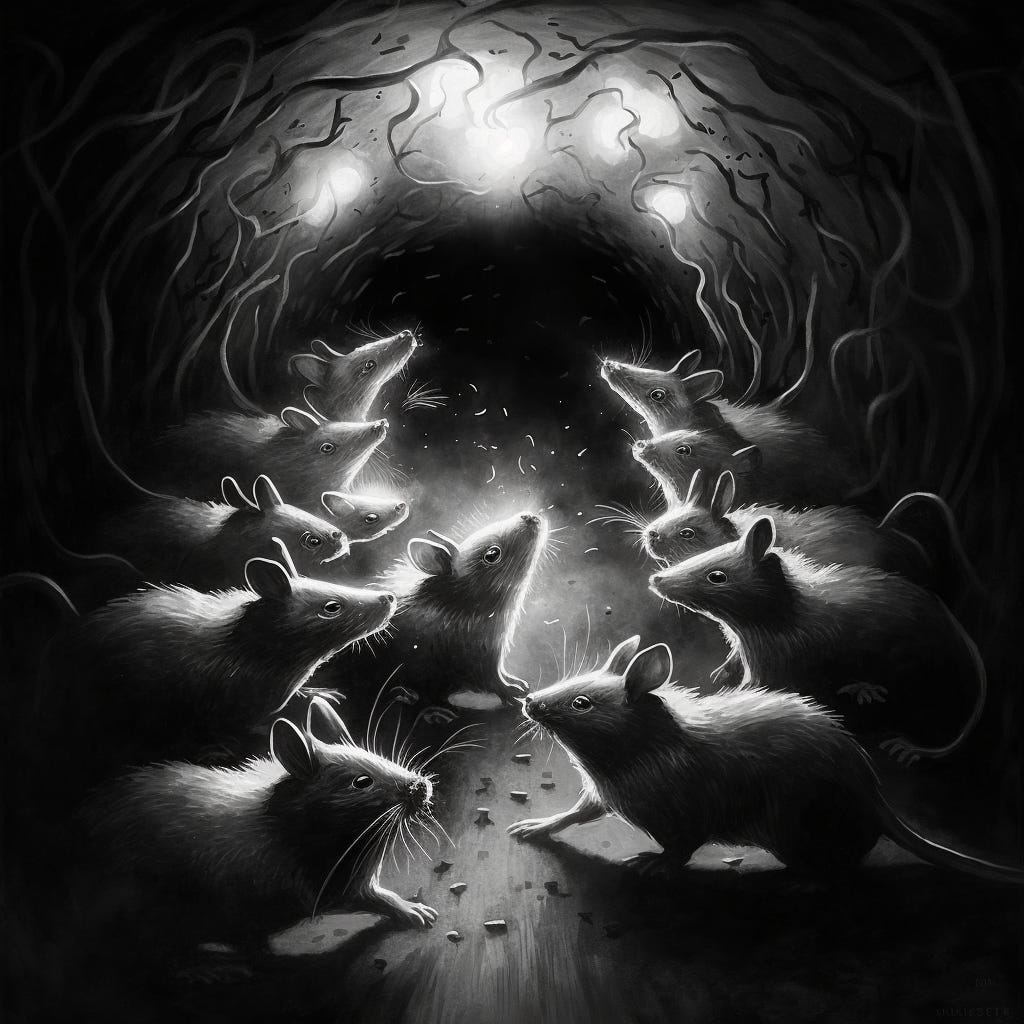Songs for the Flies to Dance To

The following is the text of the concluding ballad from the fifty-seventh Conclave of Bards. No winners of the Conclave were announced that year in light of the riots and tragedies that followed.
This is the story of three women.
The first stands on a dais, naked, her robes rumpled at her feet. A fire burns before her, untamed but controlled. She holds nothing in her hands, though they are not empty. She will never need to weep again.
The second kneels on the floor of a cabin, her clothes drenched with blood that is not her own. Smoke billows into and out of the windows, heat biting at the exposed skin of her neck and face. She squeezes the body of a dead man against her breast. If she still had a voice, she would be wailing.
The third leans against the slimy grates at the dead end of a dark tunnel. Her armor hangs ragged and her chainmail weighs heavy. She holds stable the arrow shot through her stomach, for she cannot afford to lose more blood. With her free hand, she raises a blade and snarls. The men surrounding her flinch.
This third woman’s name is Lisbeth.
⚙︎⚙︎⚙︎
Everyone knows the Conclave of Bards is rigged, but no one acknowledges it. Each Conclave, mountains of Imperial academics and bureaucrats and Catechists scour the Amal Empire, learning more about each incoming bard than even those same bards may know about themselves.
Take, for example, the seventeenth Conclave in 321 AE: Naia Hideota’s tale of the star-crossed lovers Conroy and Milius left not a single eye dry in the realm. The Emperor himself was reported to have stained his silken sleeve with tears.
But before she stepped onto the Conclave platform to recite her tale, the Imperium had learned about Naia Hideota: Her family belonged to a founding clan of Amalcross. It had risen to modest fortune through grit and lucky breaks and hard-won contracts — including enough ancient agreements with House Roarer to suggest a friendly relationship. And though the Hideotas were a rigidly patriarchal family — Naia was the lone official daughter of her eight recognized siblings — Naia was an active member of the suffragette movement House Roarer was bankrolling.
So, Naia Hideota got her time on the platform in the Great Hall, but the Emperor bequeathed his boon to a less-controversial house’s son for a milquetoast retelling of some Amal victory or another.
Take also, for example, the thirty-sixth Conclave in 511 AE, when Hylke Ezra-Tami recited his thrilling ballad about a Mardian prison break at the end of that long war.
It was an uncommonly cold spring day when he sang in the Great Hall. But when Hylke was finished, the air was stuffy and humid, and the attendees drenched in sweat, and the nipping breeze no balm at all for the heightened nerves or racing hearts.
At the time, however, the crimes of Amalcross during the Mardian War were just coming to light, and Hylke’s tale scraped too deep into the fledgling nerve. So, Hylke stood aside to watch a priest win the Empress’s boon.
And if Hylke Ezra-Tami did not know his family had descended from Mardian refugees — that they had fled the rape of their city and passed as native Amalcrossers — he would never forget it after the week he spent with the Catechists upon the Conclave’s conclusion.
Lisbeth Longhill knows all about Naia Hideota and Hylke Ezra-Tami. She knows about Teed ‘ja Bramble, too, and about Carmina Holden and Nemisin Armstrong and Bobbye ‘ja Lokta and so many more. She can recite their life stories and their Conclave ballads as if they are her own. She loves and loathes them each.
She knows them all well enough to know she has not made any of their same mistakes. Knows, too, that she will not.
And isn’t that the greatest compliment one could give their predecessors?
Lisbeth stands when the Imperial Bard calls her name. The crowd roars. The bard before her shuffles off, gasping and flushed now that his tale is finished.
She is not yet wearing her armor and chainmail. Those come later. Right now, an opalescent white robe wraps around her body from her toes up to her neck; there, it widens, silken and shimmering, around her hair and scalp like a headscarf. She made it herself, just for this occasion. A lone sash secures the robe. It will keep out prying eyes until the time is right.
Lisbeth steps onto the platform and the fifty-seventh Conclave rises around her. Citizens from throughout the Amal Empire — and some from far beyond it — cheer and clap. She gazes upon them all, her eyes roving the crowd until she finds the Emperor himself, sitting cool and expectant in his special box.
Facing him, she feels her own heart throbbing against her ribs. Loud. Heavy. Rattling her body. Or is that her own nerves, awoken suddenly at the moment of action?
“I dedicate my ballad to the Emperor of the Distant Reaches,” Lisbeth says, “to he who delivered us from the terrible night that was the long reign of Rorei the Young, so that we may tell these tales in the dazzle of day.”
The cheers rise once again. Emperor ‘ja Auric stands for his adoring crowd then dips his head graciously toward Lisbeth. He smiles.
Lisbeth smiles back.
She begins.
⚙︎⚙︎⚙︎
“There is a woman,” Lisbeth tells, “who goes by Kat. Right now, the rough hands of soldiers crush her, cold iron clasps her wrists, and a pilling cotton rag balls her mouth.
“Restrained — too beaten to thrash any further, too raw to make her voice heard beyond the rag — she can only watch as the Ambassador to the Eastern Reaches scoops the right eye out of the face of her younger brother.
“She has heard her brother scream before. A decade earlier, he broke his ankle leaping carelessly from one boulder to another. Kat and her friends carried the screaming boy three miles back to their village. Her brother’s inexhaustible agony astounded her; not even her stories could hush him as usual. He didn’t quiet until one of their fathers, Papa Wakka, healed the fracture by touch.
“But this scream is not like that. It is as jagged and cutting as shattered glass. It is inconsolable because their fathers can never heal them again. It is the scream of a man forced toward death.
“Kat, too, screams — or tries to. The cotton in her mouth smothers it. She does not yet realize there is no hope for her, either: If only these assailants could hear her words, perhaps they would listen.
“The Ambassador steps back from Kat’s brother, allowing the man to howl and thrash.
“‘You cannot outrun the Emperor,’ the Ambassador says. ‘Your fathers knew this. That they did not teach you — that Magus Wakka did not teach you — only proves their arrogance.’
“An acidic rage rises in Kat’s stomach at the mention of her fathers — at Papa Wakka’s name, especially.
“The Ambassador continues, ‘This would have been better, boy, if you were younger. But I cannot enjoy myself for too long. Emperor Rorei will have his blood. He will have the blood of Wakka ‘ja Gedworth’s heir.’
“Kat screams again, but her voice is gone. Her brother only sobs.
“A Binder bearing the insignia of Rorei the Young approaches. He holds a blade whose handle widens into a cup.
“The soldiers tighten their grip on Kat’s brother. One wrenches his head back while another rips apart his bloodstained shirt. His chest gleams with sweat in the torchlight.
“Perhaps it is now Kat finally loses her hope, or perhaps it is after what comes next. She will only remember a desperate flare of energy. She will remember how the soldiers shift to control her, and how, for one breathless moment, she feels herself released and in motion, her skin buzzing to shield her brother from steel.
“But the soldiers shove her down. And the Binder slides the blade beneath her brother’s heart as if his skin is made of paper.
“Her brother gasps. His blood first gushes, then flows in throbbing bursts, down the knife handle and into the glass chalice secured to its base. His skin — skin that once shined like gilded copper in the sun — turns pale and ashen.
“Kat crashes to the floor, too weak to breathe. The soldiers restraining her take no chances.
“When the chalice is full, the Binder withdraws the knife. Her brother crumples, his breath clicking in his throat, his hands straining and softening. The soldiers step away, and the Binder seals the cup.
“The Ambassador turns for the door and says, ‘Start the fire.’
“One of the soldiers asks, ‘What about the healer woman?’
“‘Let the bitch burn too,’ the Ambassador says. ‘May the flies dance upon their ashes.’
“Kat cannot move, even when the soldiers’ hands release her. She doesn’t see how the flames begin or when the soldiers leave. She only sees her brother, dead before her.
“The smoke billows, now, the scent of flame and rubble and blood and shit scraping at her nostrils. She realizes her handcuffs have been removed. When did that happen? Why would the soldiers grant her such a minor mercy?
“She removes the cotton rag and chokes on the smoke. She drags herself across the floor, wading through her brother’s blood. She takes his body and clutches it against her breast.
“If only the words could have left her mouth: It’s me, it’s me; I’m my father’s heir.
“If only she still had her voice, she would wail.”
⚙︎⚙︎⚙︎
“These are the atrocities from which our Emperor delivered us,” Lisbeth says.
She continues: “Her full name is Katarina Soseki Dashell, but no one has called her that since she was a child. And Kat was not a child for long.
“When she was no taller than an overgrown reed — not long after her brother had broken his ankle — the two walked home from a fishing trip only to be whisked aside by an old village auntie. The woman hid them in a basement and commanded them to neither move nor speak until she returned.
“Katarina and her brother were good children. They did as the old woman demanded. They laid in the dark, silent and scared and confused. Katarina was too afraid to sing her brother a song to calm him. To calm herself, even.
“They had only the smell of smoke to mark the passage of time. Soon they sat within stinking sops of their own piss and shit. The flies came to them, then, buzzing and biting. Though they stayed strong for the auntie, they could not wait to cry in the warm embrace of their fathers — Papas Jordan and Wakka.

“When at last the old woman returned, Katarina and her brother expected to be scolded for their mess. Instead, silently, the auntie bathed them and clothed them and fed them, then gave them both small leather packs.
“The auntie said, ‘Your fathers are dead, and the Catechists seek you both. You must leave. I will not protect you again.’
“Her brother began to weep, but Katarina could think only of a lesson Papa Wakka had taught her: Whenever you feel your most powerless, you must call on your deepest strength.
“So Katarina swallowed hard and asked, ‘Where do we go?’
“‘East, to the frontier,’ the old woman said. ‘And if you make it there, go further. That is the only way to escape Emperor Rorei’s reach.’
“The auntie thrust the children into the night. It was only days later, when they had eaten through most of their food, that Kat found the book the old woman had buried at the bottom of her pack.
“The inscription on the inside cover was in Papa Wakka’s handwriting: ‘To my darling Katarina, should the inevitable come to pass.’”
⚙︎⚙︎⚙︎
“These are the atrocities from which our Emperor delivered us,” Lisbeth says.
She squeezes her hands into fists, then opens them again.
Lisbeth continues: “By the time she and her brother reached the frontier, Kat had learned a great deal about Wakka.
“The man she knew as one of her two loving fathers — bright and jovial, with hands as gentle as they were large; who could spin yarns so spellbinding hours would pass like minutes; who was quick to sneak his children an extra candy when Papa Jordan’s back was turned — had also been a key member of the Imperial Magus’s staff.
“Kat knew Papa Wakka was a Binder. How else had he been able to heal her brother’s broken bone with only a touch? But Kat did not know of Wakka’s work: his frequent travels to the City of Glass, how he had economized the blood spells that maintained Rorei’s youth and virility, his research into experimental magic furthering chaos more than order.
“And she did not know her fathers had fled Amalcross suddenly with their two young children, nor did she know about the glyphs Wakka had been developing that could Bind the minds of others to commands unspoken — commands of unspeakable brutality and violence — so long as those others were properly conditioned.
“Yes: By the time they reached the frontier, Kat had learned a great deal about Wakka. And as she and her brother delved deeper into the vast expanse of the unclaimed East, Kat began to teach herself some of Wakka’s techniques.
“For good, she told herself. Only for good. Only to help and to heal. Only to lessen the pain and ease the hurt of all those my fathers and their Empire have harmed.
“Ten years later, Rorei’s agents found Kat and her brother in a place called Qaikannes, two hundred miles beyond the Imperial Frontier.
“These are the atrocities from which our Emperor delivered us.”
⚙︎⚙︎⚙︎
This is the story of three women. One is Kat Dashell, and another is Lisbeth Longhill. But there is still the woman who stands naked before the fire and who needs never weep again.
Patience: We shall meet her soon.
⚙︎⚙︎⚙︎
Lisbeth Longhill takes a breath. The Conclave attendees hold theirs, waiting for the next refrain in her song.
“I need not remind you of the horrors of Rorei the Young,” Lisbeth says. “That profane emperor was deposed only twenty years ago, and so many of the wounds he’d wrought are still healing. Even those of you born in the intervening decades are familiar with the pain of Rorei’s legacy.
“But I shall remind you, anyway,” Lisbeth says, and the entire Great Hall seems to sigh. “Rorei’s reign was long and cruel. It was also culmination: of legacy, of empire, of sin.
“The number of lives lost is innumerable, and the gallons of blood spilled uncountable. Even the most minor infraction could mark a man, woman, or child as fuel for Rorei’s insatiable lust for his eternal youth.
“These are the atrocities from which our Emperor delivered us,” Lisbeth says. “But until then, most of the Distant Reaches lived in fear of Rorei the Young.
“Most, but not all.”
⚙︎⚙︎⚙︎
Lisbeth continues: “It has been seven years since the heir of the traitorous Wakka ‘ja Gedworth had been bled. Seven years since he and his sister burned. Now, the ambassadorial corps are living in terror.
“Not because they are afraid of Emperor Rorei. Imperial ambassadors come from the highest echelons of the Amal Empire, the children of the Hundred Houses or of Amalguard or of legacy administrators. Though not immune to Rorei’s wrath, these parties can avoid it with care or simply transfer it to commoners.
“Besides, Rorei’s grip gives them all more leverage in their own contracts, allows them to claim the assets and land of those killed or disappeared, affords them greater freedom to use force. Ambassadors, diplomats, politicians, the Hundred Houses, even the Salavasters — all of them alike profit in their own way from Rorei’s reign.
“So, no, the ambassadors do not fear Rorei. They fear a rash of killings — brutal, obscene, inexplicable — targeting Imperial assets.
“In the freshly annexed territory of Quaikannes — now the Amal Empire’s easternmost point — both the staff of the Amalcross Diplomatic Mission and their guards are discovered with throats slit and chests made soggy messes of stab wounds. Flies swarm throughout the building, thick as black fog.
“No one can say which injury was inflicted first. Not even the perpetrator, a servant girl found blubbering in the pantry with a dull knife in one hand and a dangle of human eyes in the other. She is dangerously emaciated, as if her body was fuel for some profane magic. How this lone weak girl could slay the entire staff, let alone overpower the armed and trained guards of the Unified Militaries, eludes all reason. She is tried and hanged for high treason, her final words a mystery:
“‘The Queen of Flies shall have your eyes.’
“At the height of harvest, Emperor Rorei demands thirty percent of all grain shipments diverted to Amalcross — enough to threaten famine across the Western and Northern Reaches, despite the comfortable capacity of the Imperial stores. Shortly thereafter, the routing facility in the Far Eastern Plains burns to the ground, and the fire spreads to the surrounding wheatfields.
Once extinguished, investigators find two bodies, immolated far beyond any hope of identification, lying on the ground and covered in rabid flies. Their arms are raised as if in greeting. A placard droops between them, somehow unsinged:
“‘The Queen of Flies recants your lies.’
“And then, only thirty miles east of Sindar, the Deputy Ambassador to the Eastern Reaches’ procession is ambushed. The winds carry the screams of its assistants, attendants, and bureaucrats as far west as the Sindar railroad hub. After following the smell of slaughter for three days, the rescue party discovers a roiling sea of flies, buzzing and clambering in waves upon a bed of rotting flesh: The bodies had been disassembled and sewn back together to form a continuous mass. The surrounding sand is stained red for two weeks.
“Nearby, the rescue party finds a gang of bandits buried up to their necks in sand. Their skin cracks and tears from the sun. Their eyes are faded and mad. And their voices croak the same words, over and over, in tandem:
“‘The Queen of Flies cares not your cries.’

“Who — or what — is this Queen of Flies? Is she some wrathful god, a sadistic Uncanny Being, an Imperial Binder gone mad with malice? How does she accomplish these feats of slaughter? Her crimes creep ever closer to Amalcross, the seat of empire. Where will she strike next? And how can she be stopped?
“Desperate correspondence is sent. The Imperial Catechism is alerted. The Unified Militaries prepare to march.
“Instead, something happens that eclipses the Queen of Flies.
“After one-hundred-ten years of his arcane emperorship — seventy of which were flush with the terror of his purges and pogroms and whims — the Hundred Houses and the Amalguard end the reign of Rorei the Young.
“In his place, they install their ringleader: the honorable Zethram ‘ja Auric — he who delivered us from these atrocities.
“And what are Emperor ‘ja Auric’s words when Rorei’s body, now drained of blood magic and shriveled like a desiccated condom, lies burning upon the pyre?
“‘May the flies dance upon his ashes.’”
⚙︎⚙︎⚙︎
Lisbeth Longhill faces the Emperor once more.
“These are the atrocities from which our Emperor delivered us,” she says.
The Emperor does not return her smile.
Does this story bother him? Does it distress the realm? Is that why there are now pairs of Catechists, dissembled but unmistakable, pressing through the crowd: to apprehend Lisbeth when her ballad concludes?
Worry not, Emperor ‘ja Auric.
You see, all those subversive bards — Naia Hideota and Hylke Ezra-Tami and the rest of them — had each, ultimately, made the same mistake: They had gone to the Conclave to win. Despite their designs to humiliate the Amal Empire and bruise whomever its Emperor was, they still hoped to do so by winning.
And no matter how careful they were, or how densely they wrapped their spears in the cloth of their fictions, or how much they paid for false documents or to make lies truth or to bribe guards and bureaucrats, or even how ignorant of their own marks they had been, they were never going to win because their mistake was aiming to win in the first place.
Lisbeth Longhill is not making that mistake.
She has no interest in winning the Conclave.
⚙︎⚙︎⚙︎
The attendees in the Great Hall shuffle and murmur. Some rise to leave. Tension fills the air.
“Hush, now,” Lisbeth says.
And — somehow — the attendees do.
“Stay, now,” Lisbeth says. “Hear the end of my ballad. It is almost finished. You’ll have quite the show when it is.”
And — for some reason — those that have stood sit down again.
Lisbeth’s smile does not falter.
She continues: “Kat Dashell knows not all those she killed were her enemies. She knows many might have sympathized with her pain and supported her cause. She knows most did not deserve the violence that had befallen them. Do not deserve the violence that will befall them.
“But Kat also knows there is murder in silence, genocide in complicity. She knows how the lone stroke of one pen can damn thousands and a signature millions more. And she knows how a system, once set in motion, requires thrice the effort to stop.
“Papa Wakka’s glyphs were not the first of his magics she taught herself. She had remained true to her words as she and her brother approached — and then passed — the Imperial Frontier.
“The brief kindness of that one auntie to hide them — why, Kat will never know — followed by the necessary cruelty to banish them was not lost on her. She believed, truly, that evil could be localized, avoided, even cured. After all, not all snakes are venomous, not all venom deadly. With the right herbs and remedies, all but the worst venoms could be palliated.
“But that is just venom. Venom is no cancer.
“So Kat did not pursue those malicious, coursing glyphs at first. At first, she taught herself the magics of healing, of soothing, of bettering.
“She brought hope and health to her brother, sick with grief from their fathers’ deaths and sicker with illness from the flies. She fed and healed weary travelers on their slow journey east. And she served as healer in Qaikannes, where she and her brother settled.
“For a decade, Kat and her brother were at peace. They helped new lives enter this world and eased those ready to pass into the next. They found new family. They built new lives.
“And still, someone in Qaikannes informed the Imperial Catechism of their whereabouts — perhaps for money, or influence, or leniency. And still, no one in Qaikannes came to their aid — perhaps out of fear, or helplessness, or complicity. And still, all Qaikannes let the fire burn — perhaps from shame, or despair, or guilt.
“Reasons do not matter when you are marked for death. Excuses do not save you when you are dying. Pragmatics do not change that you are dead.
“It was when she slinked from the fire — her skin blistered and her lungs filled with ash and her clothes drenched in her brother’s blood — that Kat turned to the glyphs of Magus Wakka ‘ja Gedworth. It did not matter that her father’s book had burned in the still-blazing fire. It did not matter that she had never practiced the instructions for the glyphs. It did not matter that she had only ever gazed upon those specific, horrible pages once. The knowledge was there, and cancerous: hungry and unstoppable.
“Using the guile of her own skin, Kat tried the glyphs first on a girl who was the daughter of a friend. And then on two men who worked amongst the wheatfields. And then once more on a gang of bandits prowling the Sindar desert.
“The work never felt good. She bawled as the servant girl was overcome, then merely wept as the men fell to her will, then only sniffled when the bandits acquiesced. The work never felt good — it felt right. For she had become the Queen of Flies.
“And were not all her victims the diplomats of the Ambassador, the servants of Rorei the Young, the agents of the Amal Empire?
“So imagine Kat’s surprise when, after so much rage and death, he who delivered us from such atrocities revealed himself as the man who had unleashed her as part of the same. Imagine her burgeoning understanding of all that came before and all that would still come. Imagine her newfound clarity of purpose.
“She made her way back west. All the way back to the city from which her fathers had once fled with their children.
“And when the fifty-seventh Conclave of Bards was announced, Katarina Soseki Dashell became Lisbeth Longhill. Here she came,” Lisbeth concludes, “to sing her final song.”
Thus finished, Lisbeth undoes the sash binding her robe shut.
The garments fall to the ground, revealing her nakedness.
Not one breath passes before her glyphs enact their purpose.
⚙︎⚙︎⚙︎
Behold: Here I am.
Gaze upon me, all ye lecherous, ye criminal, ye complicit. All ye who groped for power and suckled comfort and spake silence. And all ye who look away: gaze upon me, too. Today, the righteous and the wicked are punished alike.
Gaze upon me, I who am the daughter of monsters, for now I command thee.
Gaze upon these glyphs, coursing across my naked body. Perhaps ye see motion. Perhaps ye see stillness. Perhaps ye see nothing at all. That is no matter. To each thine own eyes, for the glyphs’ work is the same — and already done.
Now turn thy gazes upon the Emperor: that wielder of the diamond scepter, that godhand of Amal, that most beatific and beloved Zethram ‘ja Auric.
Zethram ‘ja Auric, who aided the reign of Rorei the Young. Ambassador ‘ja Auric, who slaughtered my fathers and brother. Emperor ‘ja Auric, who, as upriser, promised all ye the dazzle of day even as he worked his own pleasures in the long shadows of night.
See him see me. See his eyes widen with fraught recognition. See his cheeks blush with blooming fear. See his mouth begin the scream of a man forced toward death.
Now watch his arms rise against his will. Watch his hands draw toward his head. Watch him out his own eyes, his agency overridden, and burst the jelly betwixt his fingers. And watch the blood pour from his sockets — so much blood, too much blood for one man alone.
Hear his wife scream, hear his sons shout, hear his daughters shriek. Witness the failing magics of his Imperial Magi. Witness his advisors’ helpless despair. Know the blood will not stop until I am dead.
And neither will you.
Do you yet feel the burning of your skin, the fires in your veins, the flames in your skull? That is the power of my father’s glyphs — my glyphs — igniting the tinder before me. You may tear the whole city down before I die. If you do, the Deathless Fields shall alight with my joy. For that is what these glyphs command. I shall never need to weep again.
Call me a traitor, or a wraith gone mad with grudge, or a demon of chaos incarnate.
Call me the Assailant of Amalcross, or the Bitch of Amal, or the Cunt of the Distant Reaches.
Call me Lisbeth Longhill or Kat Dashell. Or call me the Queen of Flies, come with honey-sweet and bloody murder ballads.
Call me what you may, for here I am. I will die, yes, and when you die, there I will be also. For wherever blood is borne or shit is shed, so too we come, my flies and I.
O! how we shall dance.







